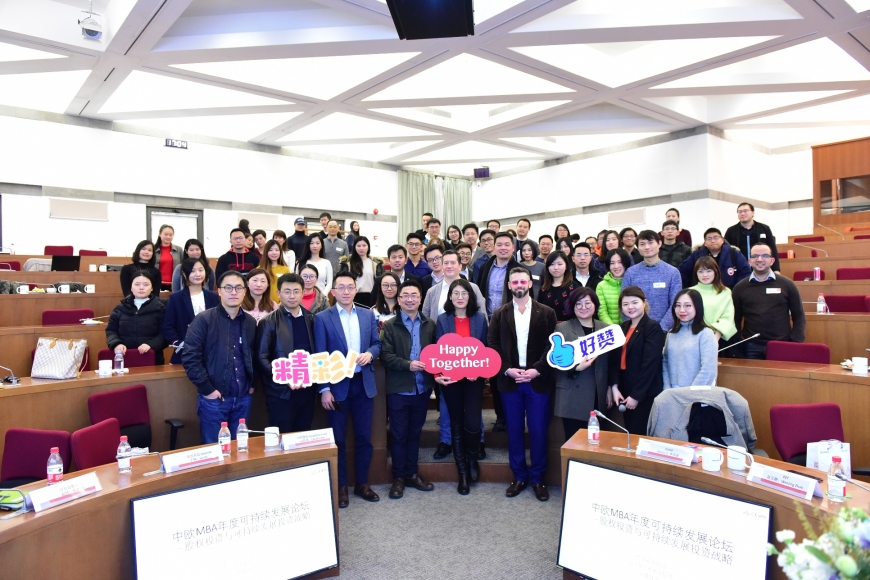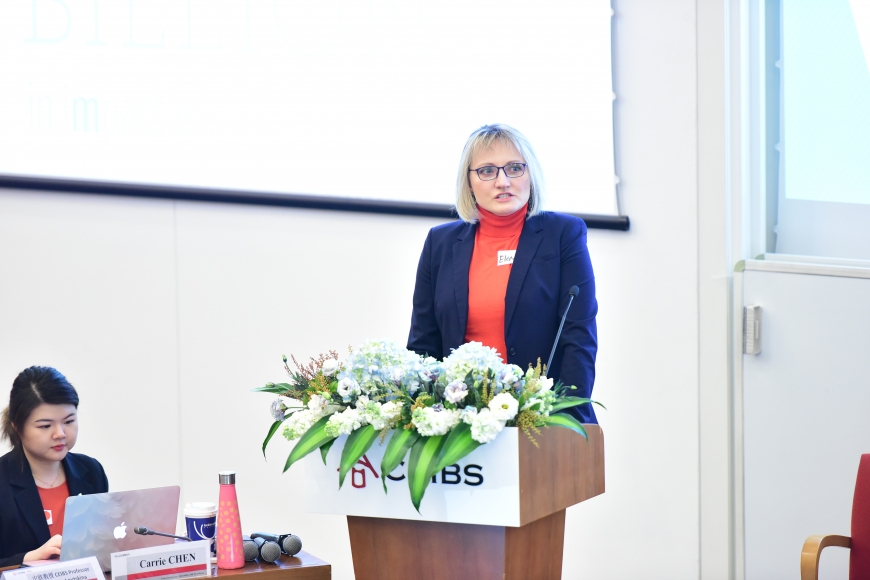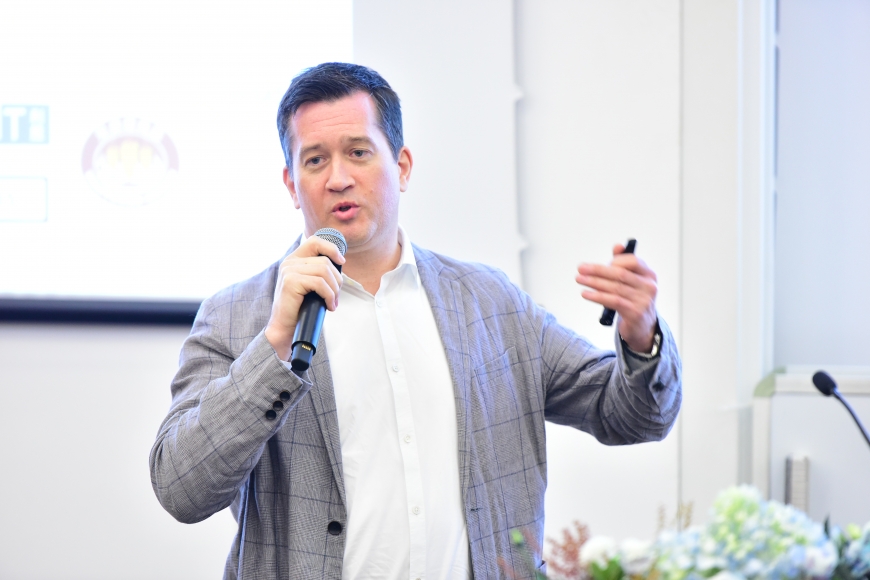Impact Investment in China
March 3, 2019. Shanghai – The CEIBS MBA Social Impact & Responsibility Club and the CEIBS MBA Investment & Impact Club recently co-hosted the 2019 CEIBS MBA Annual CSR Forum, which explored the theme of impact investment in China. During the meeting, three questions were examined:
-
What is sustainability and social responsibility?
-
How do we create a win-win situation amongst stakeholders, companies, and society?
-
What is the current status, and what are the future development prospects, of impact investment and sustainability in China?

Invited speakers spoke from personal experience in response to each question. They shared insights into social and corporate responsibility initiatives through a series of speeches and panels. They also answered questions from the audience to facilitate a more in-depth analysis of each question.
The forum serves as a platform via which CEIBS MBA, Finance MBA, Global EMBA, and EMBA students can connect with other schools, companies, and investment firms to explore the topic of social responsibility, with the ultimate goal of leveraging the impact of Chinese companies in broader society, for a more sustainable future.
Opening Remarks: Professor Elena Loutskina
Visiting Finance Professor Elena Loutskina opened the forum by examining the topic of impact investment from academic, social, and financial perspectives. Prof. Loutskina graduated from Boston College with a PhD in Finance, and is currently Professor of Finance at the University of Virginia, Darden School of Business. In her speech, she explained that impact investment is not only about the financial benefit of an investment. It is also about the impact that a business generates. Impact investment should be measurable both in terms of economic returns and social impact, and this should be done in a balanced and sustainable manner.
Portfolio companies should be able to use investment capital to create social impact value that is measurable through pre-determined KPIs. These companies should also generate economic returns, in order to eventually become self-sustaining. As a greater number of individuals and investment firms look into investing in social enterprises, impact investments gain a higher transformative potential. While it remains difficult to achieve goal congruency from economic and social impact perspectives, a number of innovative companies and structures are being formed to tackle this very issue.

Question #1: What is Sustainability and Social Responsibility?
Ruby Lv, Co-Founder of Impact Hub Shanghai, was first to address this question. She outlined a number of key milestones in the history of impact investment and the effects these events had on society. She also explained how the events changed the way Impact Hub Shanghai is managed.
The first Impact Hub in Mainland China, Impact Hub Shanghai focuses on developing companies that work in the fields of environment protection, education, sustainability, and health. The Hub serves as a centre for innovation, sustainable business development, and social impact. Ruby also hopes that, by establishing the Shanghai Impact Hub, more people will become aware of today’s most pressing social, economic, and environmental issues, and use that awareness to convene entrepreneurs, investors, and regulators, to create a positive impact for society.
During the first panel, Impact Hub Shanghai presented two companies from their incubator. The first was PET (Plastic Ecological Transformation), founded by Wenjing Zhao. Ms. Zhao explained that, through recycling, PET transforms plastic products into packaging, clothing, scarfs, and stuffed animals, among other items, to increase the value of the recycled plastic industry.
PET also hopes to increase the quality of first-hand plastic production, so that the quality of recycled products also improves, thereby creating a circular economy with a closed loop for the plastic industry. This will definitely resolve the issue of plastic waste.
The second company was OIAM, an O2O clothing sustainability platform that focuses on name brand second-hand exchange and luxury fashion reconstruction, founded by Gloria Li. OIAM advocates that all types of fashion have value, whether they are new or second hand. This can reduce the strain that clothing production puts on the environment and make the fashion industry more sustainable.
During the panel, PET and OIAM also showcased their separate products, as well as a jointly developed product, to highlight the value of recycling both plastics and clothing. The founders also asserted that cost control and profit generation are important factors for investment firms looking to make funding decisions. Ms. Li and Ms. Zhao hope to increase awareness of environmental and social issues, and turn that awareness into action. Once these actions become solutions a number of environmental concerns can be resolved.
Question #2: How do we create a win-win situation amongst stakeholders, companies, and society?
Exploration of the second question began with a speech by Chenfei Mei, a partner of the SmallVille Fund. Mr. Mei recounted a story from the TV show Billions to highlight the history of impact investment in America. The first season of the show focused on hedge funds, or how to make money. The series then moved into a second season that focused on private wealth management advisory firms that serve individual, or familial, ultra-high-net-worth investors. The third season introduced the term “venture philanthropy,” the predecessor to what is known as impact investment today.
Looking back to China, SmallVille was one of the country’s first private investment funds, following a very similar sequence to American investment funds. From family offices to investment, SmallVille eventually started looking into impact investment. Even though the impact segment may not provide the largest profit, a greater number of investors are focusing on sustainability and social impact, and not just money.
During the panel discussion, Mr. Mei discussed with two founders how investment funds and portfolio companies can create economic profit as well as social impact.
Yi Zhao is Founder and CEO of HeGrace, a company that focuses on increasing the survival rate of cardiac arrest patients in the period before they receive medical attention. A former practicing physician, Mr. Zhao understands the importance of educating the Chinese public in CPR and AED practices, as the saturation rate of these techniques is very low compared to many developed nations.
Mr. Zhao also raised the point that social enterprises are a special breed when it comes to business. For this reason, we should think of innovative business and revenue models. Since emergency medical care has huge variables in terms of the groups of people served, we can think of all society as beneficiaries of this service. Therefore, everyone, including business entities and government bodies, are clients.
Arthur Yu is Founder and CEO of Onemile Technology, which focuses on new ride-sharing technologies. Mr. Yu explained that Onemile is a company that provides both products and services, a unique business model, especially amongst social enterprises.
The three panellists shared their views on how to balance returns and create impact both from the investor side and the receiver side. Mr. Yu espoused the view that a startup has to have social value to be successful. Many investment funds see potential in social enterprises, and both sides strive towards a common goal of improving society as a whole.

Question #3: What is the current status, and what are the future development prospects, of impact investment and sustainability in China?
Peichen Song from AIpark was first to respond to the third question through a speech on an issue many major metropolises are facing: parking. AIpark is dedicated to finding a solution to resolve this issue, using AI and big data to convert these regions into “smart cities.” By using high definition imaging technology, AIpark aims to help governments and cities with various parking problems, like hard-to-find parking spaces and parking management. They are focused on increasing the usage rate of parking spaces to provide a smart, comprehensive parking solution for cities around the globe.
During the panel, Bangding Liao, from the US-China Green Fund, spoke from an investment fund perspective. He talked about finding a potential social impact company to invest in. The US-China Green Fund is dedicated to promoting sustainable green development in China through financial, technological, and business collaborations between the US and China. The fund develops green and sustainable businesses in China through equity investments, and by expanding these companies with their connections and expertise. The fund explores innovative social business models and niche markets to continue the green development in China. Both panellists shared their optimistic view of China’s social impact and impact investment industries.
Closing Remarks: GEMBA Alum Nikolaj Moesgaard
Nikolaj Moesgaard is a CEIBS alum from the GEMBA 2015 class. He also studied at INSEAD. Nikolaj is an entrepreneur with global management expertise and an extensive knowledge of the Chinese B2B environment. He is Co-Founder of LICENT, a Shanghai based licensing and brand development company, and an advisor to the Danish sovereign fund IFU in China.
During his talk, Nikolaj introduced an organisation called UNLEASH, which is dedicated to building sustainability initiatives through startup camps and accelerators around the world. He was especially excited to announce an event that will take place in China this year and encourage young entrepreneurs to take part in the experience to promote sustainability in China.













